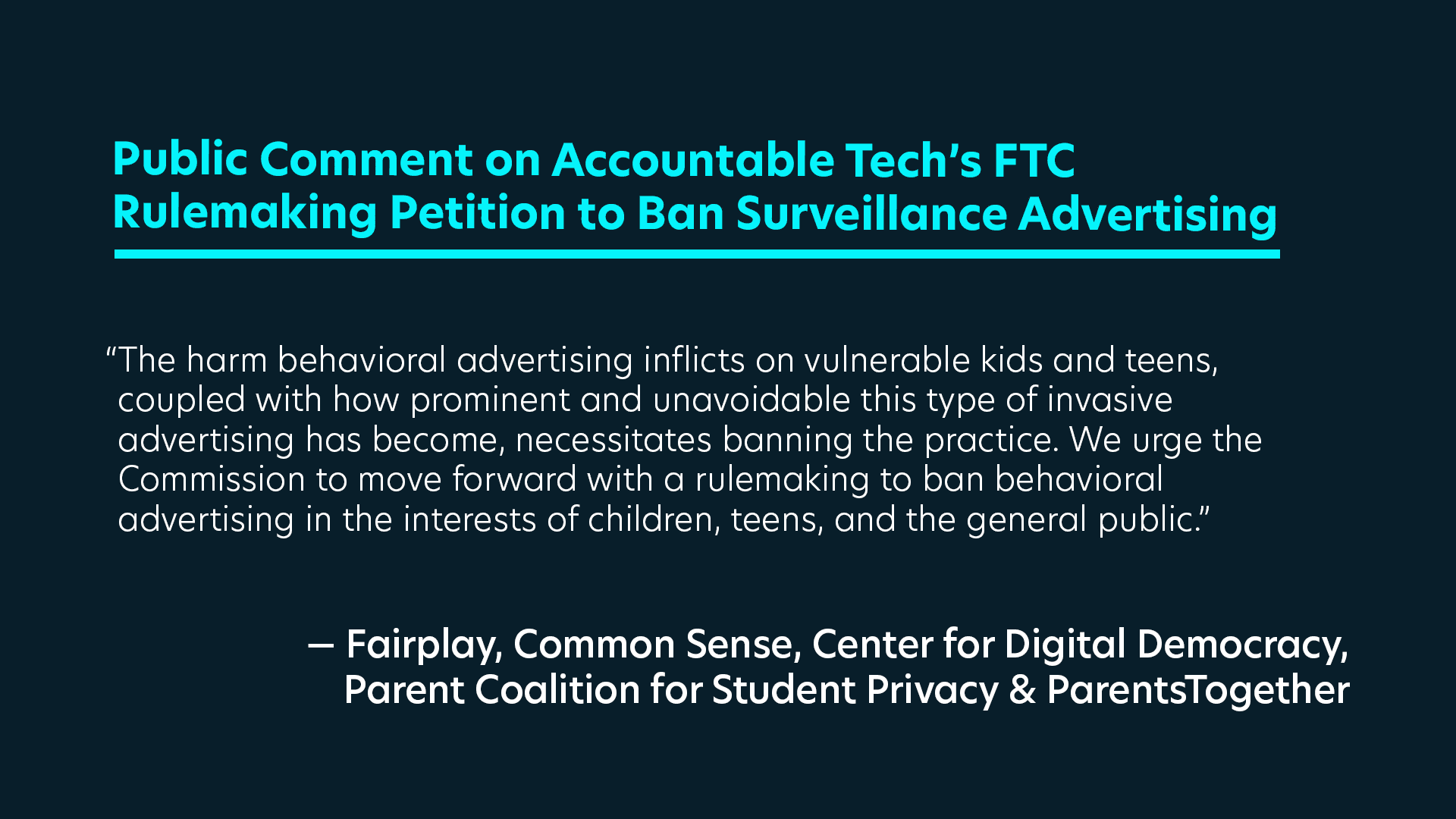In late 2021, Designed with Kids in Mind coalition member Accountable Tech formally requested that the Federal Trade Commission (FTC) ban surveillance advertising, the creepy business model that’s earned Big Tech billions. On January 26, members Fairplay, Center for Digital Democracy, Common Sense, Parent Coalition for Student Privacy and ParentsTogether filed a formal comment in support of Accountable Tech’s request, specifically outlining how surveillance advertising is unfair to children and teens and puts them at risk on the internet.
FTC? FORMAL REQUEST? COMMENT?
Yeah, that’s a lot of jargon – we know! What this all means is that Accountable Tech asked the FTC to use their power to change the rules on the internet for the better. The “formal comment” we filed along with our partners acts in two ways. First, it outlines the research that shows how banning surveillance advertising would be good for kids and teens. Second, it lets the FTC know that a number of powerful organizations (us included!) support this rule change.
WAIT, WHAT’S SURVEILLANCE ADVERTISING?
Ever had the feeling that your phone was listening to you and your friends? Have you been on the lookout for a specific style of jean jacket and suddenly jean jackets are popping up in every Instagram ad you see? That’s all because of surveillance advertising!
While your phone doesn’t actually listen to you without your knowledge (as far as we know), the apps you use on your phone (or tablet, or laptop!) do collect a lot of data from you. Platforms like TikTok and Instagram track:
– Your name
– Your location (including the places you go)
– Your age
– Your gender
– Your sexuality
– Your race
– Your ethnicity
– Your friends and family (including all of their demographic information)
– What you click on
– What you share
– What you comment
– When you open the app
– How long you spend on it
– What you search for on the app
– What you search for on other sites
– The keywords you use to search for something
– The products you put in any online shopping cart
And lots, lots more…
Apps and sites will use all of that data to make even more guesses about who you are, what you like, and how you feel, and then show you ads that are timed to be especially persuasive to you and you alone. So, that’s why it sometimes feels like you have a little spy in your pocket.
I DIDN’T SAY THEY COULD HAVE ALL THAT INFORMATION!
Unfortunately, you probably did – maybe even without knowing it. But that’s not your fault! Big Tech companies frequently ask users to share data because it will “improve their experience.” Or, they’ll bury a clause allowing them to collect all this data in their terms and conditions.
WAIT, WHAT?
Yeah, surveillance advertising is just plain spooky. But remember, Accountable Tech, Fairplay, and more powerful advocates have asked the FTC to do something about it, especially since kids and teens are exposed to it.
HOLD UP, TECH COMPANIES ARE TRACKING KIDS?
They are – even though they claim they’re not. In fact, the Children’s Online Privacy Protection Act (COPPA) makes it illegal to collect data from kids under 13! But to Big Tech companies, that doesn’t really matter — the benefits of collecting that data far outweigh the cost of a potential FTC fine in the millions of dollars. That’s because young people are an essential to the future business of Big Tech. For example, the Facebook Files revealed that when Facebook realized it was losing teen users, it allocated “almost its entire global annual marketing budget to targeting teenagers, largely through digital ads.”
The fact that surveillance advertising targets children is especially concerning because young people have far fewer developmental tools to resist marketing messages to begin with. In fact, over 75% of 8- to 11-year-olds can’t tell the difference between ads and other digital content! When advertising gets super-charged with tons of personal, sensitive information, the odds against kids and teens get stacked even higher.
Teens are especially vulnerable to surveillance advertising, considering that they have no protections from data collection when they’re online! That’s right – COPPA literally only protects children. Once you’re 13, you’re essentially treated like an adult on the internet. (I’m not sure about you, but I wouldn’t trust a 13-year-old to do my taxes, drive a car, be a doctor, rent an apartment, or really any other thing in the realm of adulthood!)
Tech companies take advantage of that, too: in 2017, leaked documents showed that Facebook bragged to advertisers that it could help them serve ads to teens when they were feeling “insecure” or “worthless.”
Even worse, algorithms like those used in surveillance advertising replicate the bias we see in the real world, creating an inequitable, racist, sexist, homophobic digital world. In fact, a report by The Markup showed that popular edtech software Naviance (a program that’s required for millions of students across the country) allowed universities to target ads on their platform by teens’ race.
WHAT CAN I DO ABOUT THIS?
There are a few things! First, you can take a look at the settings of your devices (or your kiddo’s devices) and make sure the privacy settings are up to the highest level. Here’s an explainer on how to do that for iPhone. You can also download a more secure internet browser for you and your family that doesn’t allow tracking, like DuckDuckGo. Or, you can take a minute to reconsider the apps you use and what you get out of them. Maybe using Instagram isn’t worth it for you or your kids!
Want to dive even deeper? Spread the word about how bad surveillance advertising is for young people and speak out against it!

